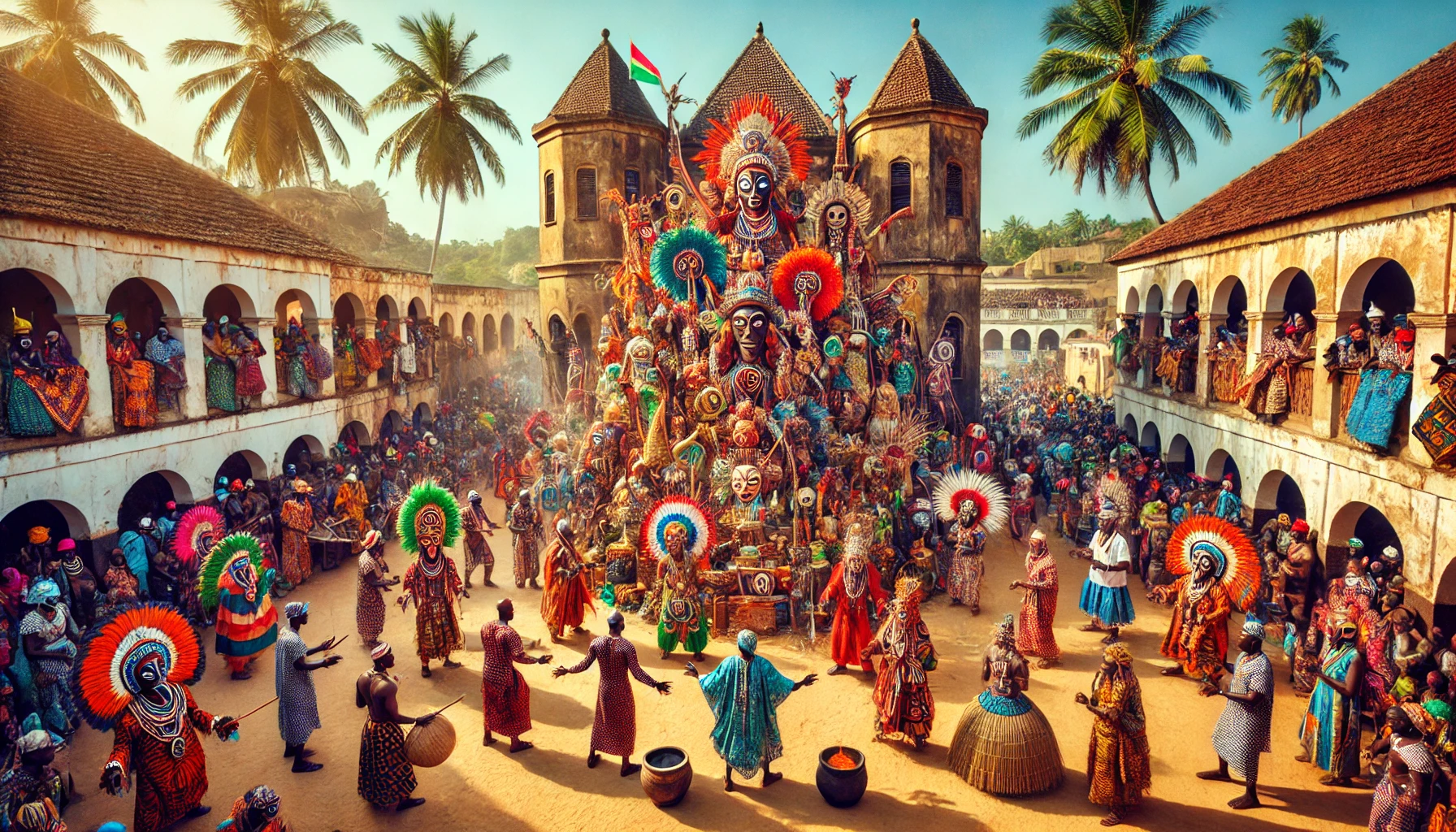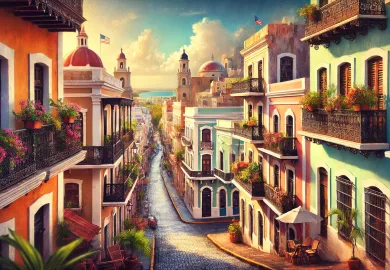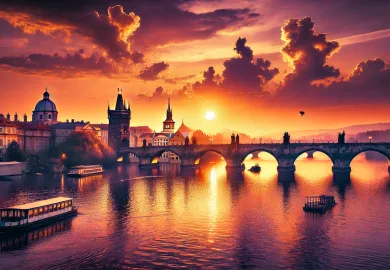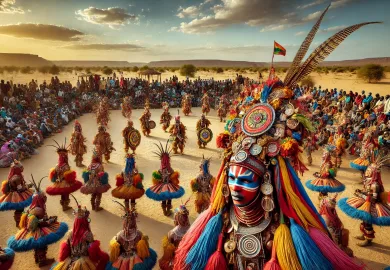
Disclaimer: This content was generated using AI. While I strive for accuracy, I encourage readers to verify important information. I use AI-generated content to increase efficiencies and to provide certain insights, but it may not reflect human expertise or opinions.
The Voodoo Festival in Ouidah, Benin, is a mesmerizing cultural spectacle that offers an immersive glimpse into the heart of West African spirituality and tradition. Celebrated annually on January 10th, this festival brings together thousands of people from across the globe to honor the rich and profound heritage of Voodoo, a belief system that has been intricately woven into the social fabric of Benin for centuries. The festival is a vibrant display of rituals, music, dance, and ceremonies that celebrate life, death, and the spirit world, making it one of the most captivating and culturally significant events in Africa.
The Historical Significance of the Ouidah Voodoo Festival
Ouidah, a coastal town in southern Benin, is often referred to as the spiritual capital of Voodoo. The town’s history is deeply intertwined with the origins and evolution of Voodoo, making it the perfect setting for this annual celebration. The roots of Voodoo in Ouidah can be traced back to the transatlantic slave trade, during which enslaved Africans were forcibly taken to the Americas. Along with their physical journey, these Africans carried with them their spiritual beliefs, rituals, and practices, which later evolved into what is known today as Voodoo.
The Voodoo Festival in Ouidah is not just a local celebration but a powerful symbol of resistance and cultural preservation. It serves as a reminder of the resilience of African spiritual traditions in the face of colonization and forced displacement. The festival also honors the ancestors who suffered during the slave trade, with ceremonies that pay tribute to those who lost their lives and those who managed to keep their culture alive despite the immense challenges they faced.
Every year, the festival begins with a pilgrimage to the “Door of No Return,” a historic site on the Ouidah beach that marks the departure point of countless enslaved Africans. This symbolic act of remembrance sets the tone for the rest of the festival, where participants engage in various rituals and ceremonies that connect them with their ancestors and the spiritual world.
The Vibrant Rituals and Ceremonies
The Voodoo Festival in Ouidah is a feast for the senses, with vibrant rituals and ceremonies that are as captivating as they are profound. Central to the festival is the worship of the Vodun spirits, who are believed to inhabit the natural world and influence every aspect of life. The festival features elaborate rituals to honor these spirits, with offerings of food, drink, and other sacred items placed at shrines and altars throughout the town.
One of the most striking aspects of the festival is the presence of Egungun, masked figures representing the spirits of the ancestors. These masked dancers are a central feature of the festival, performing intricate and energetic dances that are believed to bring blessings and protection to the community. The Egungun wear colorful, flowing costumes that conceal their identities, emphasizing their role as intermediaries between the living and the dead. Their performances are both awe-inspiring and deeply spiritual, drawing crowds of spectators who are eager to witness these powerful rituals.
In addition to the Egungun dances, the festival includes a variety of other rituals that are designed to invoke the Vodun spirits and ensure the well-being of the community. These rituals often involve the participation of local priests and priestesses, who lead the ceremonies with chants, prayers, and invocations. The use of traditional musical instruments, such as drums, bells, and rattles, adds to the intensity of the rituals, creating a rhythmic and hypnotic atmosphere that draws participants into a deep spiritual experience.
The Role of Music and Dance in the Festival
Music and dance are integral components of the Voodoo Festival in Ouidah, serving as both a form of worship and a means of connecting with the spiritual realm. The festival’s music is deeply rooted in the traditions of West Africa, with rhythms and melodies that have been passed down through generations. The drumming, in particular, is a powerful element of the festival, with its complex rhythms driving the dancers and creating a trance-like state that is essential for many of the rituals.
The dance performances at the festival are not merely for entertainment; they are an expression of devotion and a way to communicate with the spirits. Each dance has its own significance and is performed with a specific purpose in mind. For example, some dances are intended to honor the gods and goddesses of the Vodun pantheon, while others are performed to seek protection, healing, or guidance from the spirits.
The festival also features a variety of traditional dances that reflect the diverse cultural heritage of Benin. These dances often involve elaborate costumes, including headdresses, masks, and other adornments that are rich in symbolism. The dancers move with grace and precision, their movements telling stories of the gods, the ancestors, and the natural world. The combination of music and dance creates a dynamic and immersive experience that captivates both participants and spectators alike.
The Global Impact and Cultural Exchange
While the Voodoo Festival in Ouidah is deeply rooted in the traditions of Benin, it has also become a global event that attracts visitors from around the world. This international interest has transformed the festival into a platform for cultural exchange, where people from different backgrounds can come together to learn about and celebrate Voodoo.
The festival’s global impact is evident in the diverse crowd it draws each year. Tourists, scholars, and practitioners of Voodoo from the Americas, the Caribbean, and other parts of the world flock to Ouidah to participate in the festivities and deepen their understanding of Voodoo. This exchange of ideas and practices has helped to raise awareness of Voodoo as a legitimate and respected spiritual tradition, challenging the negative stereotypes that have long been associated with it.
In addition to promoting cultural exchange, the festival also serves as a platform for discussions on important social and political issues. Topics such as cultural preservation, the legacy of the slave trade, and the role of Voodoo in contemporary society are often explored in the context of the festival. This makes the Voodoo Festival in Ouidah not only a celebration of tradition but also a space for reflection and dialogue on issues that are relevant to both the local and global community.
The Voodoo Festival in Ouidah is a testament to the enduring power of cultural heritage and the importance of preserving and celebrating spiritual traditions. Through its vibrant rituals, music, dance, and ceremonies, the festival offers a unique and profound experience that connects participants with the past, the present, and the spiritual world. As the festival continues to grow in popularity, it serves as a reminder of the resilience and richness of African culture, and its ability to inspire and unite people from all walks of life.








